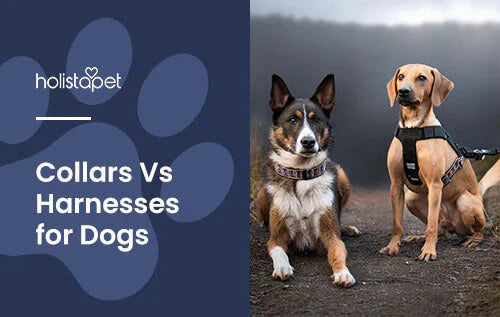Ever wonder, "When is a dog considered a senior?" The answer isn't set in stone, but most canine pets become senior dogs around the age of seven. But it really depends on their breed, size, and a few other factors.
As your canine companion enters their senior years, you might notice a few charming changes. A little extra gray, maybe some slower steps, but with the right care, those golden years can be the best yet!
Factors That Determine When a Dog Becomes a Senior
While age plays a huge role in determining when younger dogs turn into wise old pups, a few other factors can speed up or slow down the process. They include:
- Breed Size. Individual dog breeds age differently. For example, large-breed dogs tend to age faster than small breeds.
- Genetics. Some dogs possess genes that keep them spry well into their later years, while others might slow down a bit sooner.
- Overall Health. A healthy dog with proper nutrition and regular vet checkups can delay the signs of aging.
- Lifestyle. Energetic dogs with regular physical exercise and mental stimulation may age more gracefully than sedentary pups.
Size and Breed Influence on Aging

Did you know that your dog's size and breed can influence how they age? Large and giant breeds like Great Danes might start showing their senior side as early as six. Meanwhile, smaller dogs like Cavalier King Charles Spaniels might still be bouncing around well into their teens.
It's almost like doggy time travel! Bigger dogs zoom through their puppy days and hit their senior status faster, while smaller pups enjoy a more leisurely pace. No matter the breed, with a little extra love and care, you can help them age gracefully.
Lifespan Differences Between Small, Medium, and Large Dogs
When it comes to a dog's expected lifespan, size really does matter. Small dogs, like the feisty Chihuahua, often have the longest lifespans, sometimes reaching 15 to 18 years. Medium-sized dogs, such as Beagles, usually live around 12 to 15 years, while large and giant breeds, like the majestic Bernese Mountain Dog, may only reach 7 to 10 years.
Think of it like this: Small dogs are the marathon runners of the dog world, while larger dogs are sprinters. Regardless of size, every dog's senior years can be full of love, snuggles, and fun adventures with the right care.
Recognizing Signs of Aging in Your Dog
As dogs age, changes may occur slowly. Awareness of the signs can help you give your furry companion the best care:
- Slower Movement. As a dog ages, they may start slowing down or showing less interest in physical activities.
- Graying Fur. An aging dog may develop gray hairs around their muzzle or face as they grow older.
- Changes in Sleep Patterns. Older dogs may also sleep more frequently or seem less active throughout the day.
- Hearing and Vision Loss. You might notice your senior dog responding less to sounds or bumping into objects.
- Behavioral Changes. Aging dogs can experience shifts in behavior, such as increased agitation or confusion, which may indicate canine cognitive dysfunction.
Health Tips for Older Dogs
With a few simple changes, you can help your senior dog stay healthy and full of life. These health tips don't constitute medical advice, but they may be able to help, along with your vet's guidance:
- Balanced Nutrition. Feed your dog a diet that supports their age and health status. Proper nutrition helps maintain a healthy weight and keeps them energized.
- Regular Exercise. Keep your pup moving with low-impact activities like gentle walks or swimming to maintain healthy joints and muscles.
- Mental Stimulation. Puzzle toys and interactive games can help your dog maintain mental alertness, helping slow down cognitive decline.
- Comfortable Resting Areas. Provide a soft, supportive bed to ease any joint discomfort your dog may experience.
Regular Veterinary Checkups
As dogs age, their health can change quickly. Those extra checkups help catch any issues before they become bigger problems.
A vet visit is a chance to ensure your dog is on the right track, from their weight to their overall wellness. Plus, who doesn't love a little extra attention at the vet's office?
Adjusting Exercise Routines for Senior Dogs

Your senior dog may not be running in circles anymore, but they still need to stay active. So, be sure to adjust their exercise routine to fit their age. Think low-impact activities like gentle walks, swimming, or even light fetch games.
It's all about keeping it fun and easy on their joints. A little daily movement helps maintain healthy muscles and joints, prevents weight gain, and keeps those tails wagging.
Adjusting Your Dog's Diet as They Age
As your dog grows older, their nutritional needs change. Senior dogs may need fewer calories to avoid weight gain but still need nutrient-rich meals to support their overall health.
Focus on high-quality protein, healthy fats, and joint-supporting ingredients like glucosamine. Avoid overly processed foods and exercise portion control to maintain your pup's ideal weight.
Healthy Supplements for Senior Dogs
Healthy supplements can give senior dogs the extra boost they need to thrive. The right supplements, like these ones we offer, can make a big difference in your aging pet's well-being:
- Joint Support Supplements. Help your dog maintain mobility with our Joint Support Soft Chews for Dogs, CBD Dog Treats + Joint and Mobility Care, and CBD Mobility Chews for Dogs. These tasty treats deliver joint-supportive ingredients to help older dogs deal with joint discomfort.
- Skin, Coat, and Nail Supplements. Keep your pet's skin and coat shiny and healthy with our Skin, Coat, & Nail Soft Chews for Dogs. With ingredients like fish oil, aloe vera, ascorbic acid, and biotin, these snacks keep your pup looking and feeling fabulous.
- Dog Probiotics Supplements. Support your dog's digestive health with our Probiotics Soft Chews for Dogs. These feature a proprietary blend of 9 beneficial bacteria (a total of 3 billion CFU) to help maintain a healthy gut in your senior pup.
Related Post: Benefits of CBD for Senior Dogs
Common Health Issues in Senior Dogs
Aging dogs can face various health issues requiring extra care and attention. Watch for these potential problems in your senior dog:
- Joint Pain. Older dogs commonly experience joint discomfort, which can limit their mobility.
- Weight Gain. Metabolism slows down in senior dogs, making weight gain more likely.
- Gum Disease. Dental health often declines with age, leading to gum disease or tooth loss.
- Canine Cognitive Dysfunction. Like humans, dogs can experience cognitive decline as they age, causing confusion or forgetfulness.
Final Thoughts: Senior Dog Age
Caring for a senior dog means embracing their golden years with all the love, belly rubs, and tail wags they deserve. Knowing when your dog hits senior status can help you make the little tweaks that keep them feeling young at heart.
At HolistaPet, we're all about keeping those senior years full of joy and adventure. With our natural remedies, your pup's golden years can shine even brighter. After all, they've been your loyal companion, and now it's time to help them thrive!







![Probiotics For Dogs [Soft Chews] - HolistaPet](http://www.holistapet.com/cdn/shop/files/Probiotic-Infographic-1_472d7a29-e30c-435a-9638-1365d8c3a9f9.jpg?v=1725384841&width=104)



























Leave a comment
All comments are moderated before being published.
This site is protected by hCaptcha and the hCaptcha Privacy Policy and Terms of Service apply.